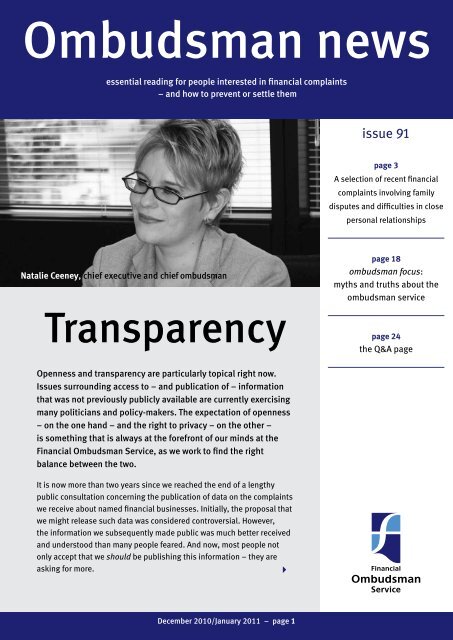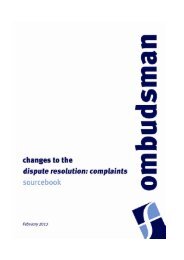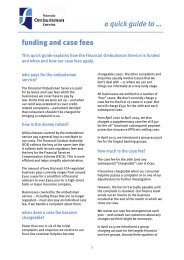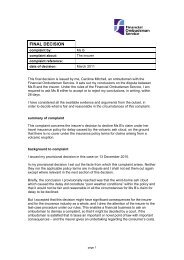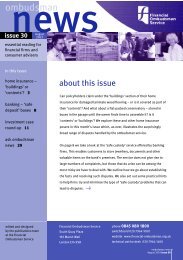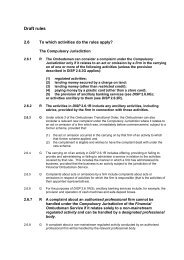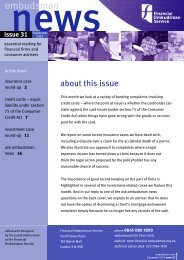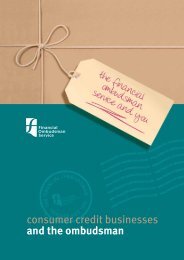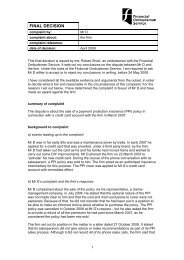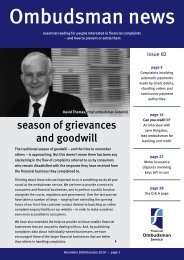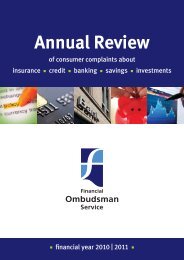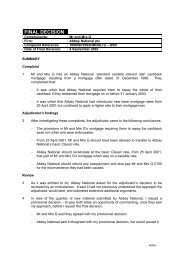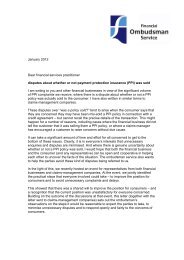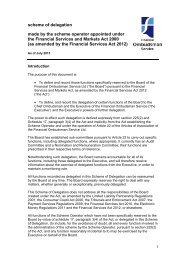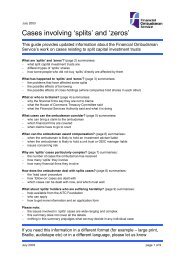Ombudsman News Issue 91 - Financial Ombudsman Service
Ombudsman News Issue 91 - Financial Ombudsman Service
Ombudsman News Issue 91 - Financial Ombudsman Service
- No tags were found...
You also want an ePaper? Increase the reach of your titles
YUMPU automatically turns print PDFs into web optimized ePapers that Google loves.
This is, of course, very much a reflection of what is happening in society moregenerally – with rapid changes in technology making it ever-quicker and easierfor people to get access to information of all kinds. This in turn fuels a demandfor yet more data.We are currently preparing to start the annual round of consultation onour corporate plan and budget for the next financial year. And transparencyis one of several major projects we will be working on over the coming year.What does greater transparency mean? What more can we make available– to whom – and about which areas of our work?We greatly welcome debate on these issues and will be consulting all ourstakeholders as we examine the costs and benefits of transparency and howit fits with our other priorities and responsibilities.Meanwhile, in this last issue of <strong>Ombudsman</strong> news for 2010 we take theopportunity, on page 18, to tackle some of the myths about the ombudsmanservice that I and some of my colleagues have come across during the year,particularly when talking to some of the smaller businesses that generallyhave less direct contact with us.We also feature a selection of recent complaints involving a variety of differentfinancial products, where the consumers concerned are also involved in familydisputes or encountering serious difficulties in close personal relationships.This may not seem a particularly cheerful topic for the time of year. However,it reflects the reality that complaints such as these, where consumers findthemselves in difficult or distressing circumstances, reach us as often duringthe festive period as they do throughout the rest of the year.Natalie Ceeneychief executive and chief ombudsmanswitchboard020 7964 1000South Quay Plaza183 Marsh WallLondon E14 9SRconsumer helpline0800 0 234 5670300 123 9 123open 8am to 6pm Monday to Fridaytechnical advice desk020 7964 1400open 10am to 4pm Monday to Fridaywww.financial-ombudsman.org.uk© <strong>Financial</strong> <strong>Ombudsman</strong> <strong>Service</strong> Limited.You can freely reproduce the text,if you quote the source.<strong>Ombudsman</strong> news is not a definitivestatement of the law, our approach or ourprocedure. It gives general information onthe position at the date of publication.The illustrative case studies are based broadlyon real-life cases, but are not precedents.We decide individual cases on their own facts.December 2010/January 2011 – page 2
... she told the bank she did notwant her husband to know whereshe was now living.case studiesWe also thought the bank was rightto compensate Mrs G for the distressand inconvenience caused by itsfailure to keep her details confidential.However, we said that in the particularcircumstances of this case, £350 wouldbe a more appropriate sum. The bankagreed to increase its offer and the casewas settled on that basis. nn <strong>91</strong>/2consumer says bank failed to notifyher of her brother’s mortgage arrearson a property in which they both hadan interestMrs K and her brother, Mr T, inherited ahouse from their aunt. The house hadbeen remortgaged very shortly beforetheir aunt’s death and they took overthe mortgage in joint names. However,they agreed between themselves thatas only Mr T would be living in thehouse, he would be solely responsiblefor the mortgage repayments. If theyeventually sold the house, they wouldsplit the proceeds between them.Mrs K and her brother did not keep intouch and it was purely by chance, overa year later, that she found out the bankwas about to repossess the house, asMr T had fallen seriously behind withthe repayments.The bank was unable to sell the houseat a high enough price to completelyrepay the amount outstanding on themortgage. Mrs K reacted angrily whenthe bank told her that she and herbrother were jointly responsible forclearing the remaining debt.She said that if the bank had consideredher to be ‘in any way’ responsible forthe situation, it should have told herabout the mortgage arrears as soonas they began to build up. As it was,she said she had not known about theproblem until it was too late for her todo anything about it. 4December 2010/January 2011 – page 5
case studies... we said the bank wasnot responsible for the lack ofcommunication betweenher and her brother.The bank pointed out that themortgage was in joint names and thatall correspondence about it had beenaddressed jointly to her and her brotherand sent to the mortgaged property.It said Mrs K had never queried this orasked it to send correspondence to herseparately, at a different address.In response, Mrs K insisted that shewas not responsible for her ‘brother’sproblem ’. Unable to reach agreementwith the bank, Mrs K eventually broughther complaint to us.complaint not upheldMrs K said it had never crossedher mind to ask the bank to sendcorrespondence about the mortgageto her at her home address. She hadconsidered it Mr T’s responsibility to‘deal with all the paperwork’, as he wasthe one who lived in the property. Hehad never shown her any of the bank’sletters about the arrears or told her hewas in difficulties with the payments.She said this was ‘no surprise’ as theyrarely spoke to one another.There was no disagreement overthe amount of the arrears. And Mrs Kadmitted she could not have affordedto contribute to the mortgagepayments, or to pay the arrears,even if she had known about thesituation at an earlier stage.She did not dispute that when she hadinherited the house and taken on thejoint mortgage, she had been clearlyinformed that she and her brother werejointly responsible for the repayments.We said the bank could not reasonablyhave known that she had never seenthe letters it sent to her and her brotherjointly at the mortgaged property.Nor could it be held responsible for thelack of communication between herand her brother. And we noted that shewould not have been able to preventthe repossession by paying the arrears,even if she had known about them.So we told Mrs K that the bank was notacting unfairly in refusing to waive herliability for the amount still outstandingon the mortgage. We did not upholdthe complaint.nDecember 2010/January 2011 – page 6
case studiesWe did not uphold the complaint.We said there was no evidence tosuggest that she had been misled orthat she had failed to understand theobligation she was taking on. nn <strong>91</strong>/6consumer complains that financebusiness should have ensured loanrepayments were affordable beforeapproving her applicationThe business did not accept that it wasin the wrong. It said it had acted entirelyresponsibly and had put her loanapplication through the normal processof credit checks and credit-scoring,based on the information she hadprovided. It therefore saw no reasonwhy she should not be held liable torepay the amount she borrowed.Unhappy with this response,Ms T came to us.Ms T complained that a financebusiness was pursuing her for adebt she was unable to afford.She maintained that the businessshould have checked that she couldafford the repayments before it lenther the money.She said her partner at the time, Mr C,needed to buy a car but had run intodifficulties obtaining finance because ofhis poor credit rating. He had thereforepersuaded her to take out a loan herselfin order to buy the car.She said he promised to give her acash sum each month to cover therepayments. However, after a coupleof months he started paying a smalleramount and eventually he left her,taking the car with him.When the finance business contactedMs T about the arrears, she argued thatthe fault lay with the business itself fornever having made proper checks abouther financial circumstances.complaint not upheldWe noted that in processing Ms T’sapplication, the business had fullycomplied with the Finance and LeasingAssociation code. The applicationform, which Miss T had completed andsigned, stated that she was in full-timeemployment. However, when she madeher complaint to the business she hadsaid she was unemployed.We asked Ms T to explain why sheconsidered the loan to have beenunaffordable from the outset. We alsoasked her to tell us more about heremployment history.We eventually established that shehad been unemployed at the time sheapplied for the loan and had not been inwork since then. She told us it had beenMr T’s idea that she should say she wasin employment, as it seemed unlikelyshe would get the loan otherwise.We did not uphold the complaint. nDecember 2010/January 2011 – page 10
n <strong>91</strong>/7insurer refuses to pay claim for theftand damage caused by policyholder’sformer partnerSix months before the date set forher wedding, Ms C moved in with herfiancé, Mr J. Shortly after that shediscovered he was having an affair witha work colleague. Ms C decided to endthe engagement immediately and aftergathering up as many of her belongingsas she could easily carry, she went tostay with her sister.Three months later, Mr J returned homefrom a few days’ holiday to find thatsomeone had broken into his house.A considerable amount of damagehad been done to the interior and allthe clothes in his wardrobe had beensprayed with paint. A number of Mr J’spersonal possessions were missing,as were most of the items belongingto Ms C that she had left behind whenshe moved out.The police confirmed that there was nosign of any forced entry and Mr J toldthem the most likely culprit was Ms C.He said he had not seen her since theevening she had left him but he thoughtshe still had a key to the house.In due course, the police arrestedMiss C and brought charges againsther for theft and for damage to hishouse and property.Mr J was kept waiting for a numberof weeks for any response after hesubmitted a claim to his insurer.When he asked the reason for thedelay, he was told that his paperworkhad been temporarily mislaid but thatit had since been located. Then overthe next few weeks he was twice askedfor information that he had alreadyprovided. The insurer eventually toldhim it would not pay the claim. It saidhis policy did not provide cover where‘damage and/or theft were caused by aperson or persons legally entitled to bein or on the buildings’.Mr J argued that this was unfair, in thecircumstances, but the insurer wouldnot reconsider the matter. He thenbrought his complaint to us.complaint upheldWe noted that the incident hadoccurred three months after Ms C hadmoved out of the house. It was clearthat neither party wanted anythingmore to do with the other, and wesaw evidence that all the weddingarrangements had been cancelledshortly after Ms C had left.We said that the policy exclusion wasnot, in itself, unreasonable. However,we thought that in the particularcircumstances of this case it hadbeen applied unfairly. We upheld thecomplaint and said that the insurershould settle Mr J’s claim in full. 4case studiesDecember 2010/January 2011 – page 11
case studiesn <strong>91</strong>/10bank wrongly allows withdrawal fromjoint savings accountMrs Q complained to her bankafter discovering that her husband,from whom she had recentlyseparated, had withdrawn moneywithout her knowledge from thesavings account set up for thebenefit of their young daughter.She thought it ‘quite improper ’ thatthe bank should have allowed him to‘spend his own daughter’s money totry and regain favour with the child ’.She therefore wanted the bank toforce him to pay the money back.She also thought the bank’s offer of £100for her own distress and inconveniencewas ‘not enough to punish the bank forthe seriousness of its mistakes ’.She and her husband were jointtrustees of the account and thebank should have required boththeir signatures before allowingthe withdrawal of any money.However, following their separationMr Q had been able to make severalwithdrawals, totalling £1,100,without his wife’s signature.The bank apologised for its errorin not obtaining both signatures.It reimbursed the account with the£1,100 that Mr Q had withdrawn andit offered Mrs Q a payment of £100,‘in recognition of the distress andinconvenience caused ’.Mrs Q did not think this was sufficientto resolve the matter. Her husbandhad said he took the money from theaccount in order to pay for the holidaythat he and his daughter had recentlytaken. Mrs Q had been under theimpression he paid for the holiday ‘fromhis own money ’.Unable to reach agreement with the bank,Mrs Q brought her complaint to us.complaint not upheldWe accepted that Mrs Q had beendistressed that the bank had allowedher husband to withdraw money fromthe account without her signature.However, the bank had admitted itserror and repaid the money. So we toldMrs Q that her daughter had not beendisadvantaged by the bank’s mistake.We explained that it was not for thebank to specify how the funds could bespent – and the bank could not requireher husband to repay the money,as she had wanted it to do.We also explained that the bank’s offerto pay her £100 was a reasonable one,in the circumstances. The purpose ofsuch awards is to provide compensationfor distress and inconvenience – not topunish businesses for their mistakes.We did not uphold the complaint. nDecember 2010/January 2011 – page 14
n <strong>91</strong>/11consumer says bank gave a thirdparty access to a joint accountwithout authorityMrs B complained that her bank hadallowed ‘unauthorised access’ to thejoint account belonging to herself andher husband. She said that she usuallyleft all financial matters to her husband.However, as he had now ‘moved away’she had started looking more closely atvarious aspects of their finances.She had been very concerned todiscover that six months earlier thebank had given a debit card toMs Y, who at that time was the family’sau pair. Mrs B complained that this cardenabled Ms Y to spend money from thejoint account ‘without restriction’.She said that as she had neverauthorised this, the bank must haveacted – incorrectly – solely on herhusband’s instructions.The bank told her that, to the best ofits knowledge, she had approved thisarrangement. It sent her a copy ofthe authorisation that it said she hadsigned but Mrs B said the signature wasnot hers.The bank maintained that there wasno discernible difference between thatsignature and the one it held on itsrecords for her accounts. It thereforerefused to accept that it had actedimproperly in adding Ms Y to the account.Mrs B then referred her complaint to us.complaint not upheldWe looked at the signature on the formthat the bank said Mrs B had signed –and compared it with the signaturethe bank had on file for her. We agreedwith the bank that there was nodiscernible difference.We then asked the bank to send usdetails of the expenditure on theaccount for the six months before andafter Ms Y had been able to use it.The overall amount spent wasapproximately the same in bothperiods. However, we noted twosignificant differences. After Ms Yhad begun to use the account,regular weekly debit card payments– of roughly similar amounts – weremade at a supermarket near Mr andMrs B’s home.In the six months before Ms Y was ableto use the account, the debit card hadnot been used at any supermarkets.But there had been much larger cashwithdrawals each week than was thecase once Ms Y had access to the account.We asked Mrs B for her commentson our observations. She said shewas unable to offer any explanation.However, she admitted that one ofMs Y’s responsibilities had been to dothe family’s weekly food shopping. 4case studiesDecember 2010/January 2011 – page 15
case studiesShe also told us that she had suspectedMr B of having an affair with Ms Y,so she had asked the au pair to leave.We concluded that Mrs B had probablyagreed that Ms Y should have accessto the account, in order to make iteasier for her to pay for the family’sshopping. We suggested to Mrs Bthat she might simply have forgottensigning the bank’s authorisation form– after becoming concerned about thepossibility of an affair.We said there was no evidence thatthe bank had acted incorrectly. It hadproperly insisted on obtaining thesignatures of both her and her husbandbefore allowing Ms Y to have the debitcard. We did not uphold the complaint. nn <strong>91</strong>/12insurer declines claim for damage andtheft relating to rented propertyMrs W inherited a house in a townsome distance from where she and herhusband lived. The town had a largestudent population and she thoughtthat instead of selling the house,she might instead obtain an incomeby letting it. She was still weighingup the options when her nephewasked if he could rent the house,as he had just obtained a place atthe university nearby.Mrs W later told us her husband hadsaid she should ‘do things properly andformally ’ even though she was ‘dealingwith family ’. She therefore arranged forher nephew, Mr T, and two of his friendsto sign a one-year assured shortholdtenancy agreement. She insisted ontheir paying her a deposit of £2,500against the cost of any damage to theproperty. She also took out a landlords’insurance policy.For some months, everything appearedto be working out well – and the rentwas always paid on time and in full.But then the student daughter of one ofMrs W’s friends, who was at the sameuniversity as Mr T, said she had heard‘disturbing rumours ’ about the rentedproperty. All the downstairs windowsof the house were boarded up andthere were stories of ‘unusual activity’and of ‘much coming and going atunreasonable hours ’.After trying without success to contacther nephew, Mrs W and her husbandvisited the house. They were unableto gain access to the property as thelocks had been changed. Mrs W thencontacted the police.In due course the police entered thehouse and found it had been turnedinto a cannabis factory. The interior wassubstantially damaged and most of thefurniture and fittings had disappeared.There was no indication that anyonehad recently been living there.December 2010/January 2011 – page 16
... she had heard ‘disturbing rumours’about the rented property.case studiesMrs W tried again to get in touchwith her nephew but had no success.The university term had just endedand he and his friends were thoughtto have ‘gone off travelling’.Mrs W then put in a substantial claimto her insurer for malicious damage,vandalism and theft. The insurerrefused to pay out, as it said the policyspecifically excluded damage or losscaused by any of the tenants.Mrs W argued that there was noevidence to suggest that her nephewor any of the other tenants had beenresponsible. She thought the scaleof the enterprise suggested that a‘criminal gang ’ was involved. And shesuggested that this gang must havethreatened the students and forcedthem to hand over the house andgo into hiding.complaint not upheldWe noted that Mrs W had discussedthe situation in detail with the police.They had told her there was no evidencethat her nephew and his friendshad been approached by criminals.And there was no evidence that any‘outsiders’ were involved.We said that, on the balance ofprobabilities, it appeared more likelythan not that Mrs W’s tenants had beeninvolved in setting up and running thecannabis factory. Given the specificterms of the insurance policy, we saidthe insurer’s stance was reasonable.We did not uphold the complaint.n n nThe insurer told Mrs W that as therewas no evidence to support her viewof events, it was not prepared toreconsider the matter. Mrs W thenreferred her complaint to us.December 2010/January 2011 – page 17
ombudsman focus:myths and truths about theombudsman servicemythThe ombudsman ignores the law by using‘fairness’ to decide complaints.truthIt is the law itself, laid down by parliament,that requires the ombudsman to decide caseson the basis of ‘fairness’ – while complyingwith the Human Rights Act.The principle of ‘fairness’ lies at the heartof modern consumer-protection legislationapplied in the courts – including the UnfairContract Terms Act, the Unfair Terms inConsumer Contracts Regulations and the‘unfair relationships’ test in the ConsumerCredit Act 2006.Most of the complaints we handle turn ondisputes about what actually happened– or on the application of general legalprinciples. In most cases, our approach isbased on what the courts would be likely todo in similar circumstances. But in some areas,the standards that the industry has voluntarilyimposed on itself (through its codes ofpractice) exceed the law’s requirement.mythThe ombudsman’s approach lackstransparency.truthEvery year we issue literally hundreds ofthousands of decisions, views, opinions andadjudications – sent directly to the individualbusinesses and consumers whose complaintswe settle. So our approach in each case isopen and transparent to the parties involved– but not to anyone else.Some argue this is ‘justice behind closeddoors’ – while others say that settlingcomplaints out of the glare of publicityis what makes private dispute resolution soeffective. After thirty years of not publishingombudsman decisions for all to see,we are keen for a debate on this subject.Should we make every decision publiclyavailable? And where does ‘privacy ’fit into the transparency debate?Meanwhile, we continue to set out ourprocedures and general approach to resolvingdifferent types of complaints in a wideDecember 2010/January 2011 – page 20
ange of publications, all available on ourwebsite (named ‘website of the year ’ by thePlain English Campaign last year, followingnominations from the public).The website includes our online technicalresource – with technical notes, case studiesand further reading on everything fromcaravan insurance to spread-betting.The FAQs section of our website also answersthe hundred or so questions we are mostfrequently asked by businesses.We publish case studies and articles monthlyin <strong>Ombudsman</strong> news. And we take part inroadshows, seminars, conferences and otherevents across the UK – to meet financialservices practitioners face-to-face and answertheir queries.Businesses can also contact our dedicatedtechnical advice desk for free advice.The technical advice desk (phone 020 79641400) handles 20,000 calls a year fromindustry practitioners – and deals withtechnical queries across the whole range offinancial products and disputes we cover.We understand that a specific complaintmay be the first of its kind for the businessdealing with it. However, given the breadthof our experience and the extent of our remit,we see few complaints where we haven’talready dealt with similar issues before.So we are keen to talk about our wellestablishedapproach to most types ofcomplaint – and to refer to informationalready available on our website.But should we be publishing more –and if so, what and how?mythThe ombudsman uses hindsight to applytoday’s standards to yesterday’s events.truthOur rules require the ombudsmen to takeaccount of the law, regulators’ rules,and industry good practice as at the timeof the events concerned. We recognise, forexample, that the FSA’s ICOBs rules werepreceded by GISC standards, which werein turn preceded by ABI codes. 4December 2010/January 2011 – page 21
ombudsman focus:myths and truths about theombudsman servicemythThe way the ombudsman is fundedis unfair – and consumers shouldhave to pay.truthAll ombudsman schemes in the UK –from the Parliamentary <strong>Ombudsman</strong> to thePrisons and Probation <strong>Ombudsman</strong> –are free to consumers. And this was adefining feature of the ombudsman schemesestablished by the financial services industryitself back in the 1980s – and the modelon which we are based.80% of our funding currently comes fromcase fees, so it is based on the number ofcomplaints businesses actually have with us.At £500, these case fees are much less thana business would have to spend if theircustomers pursued legal action throughthe courts, rather than bringing theircomplaint to us to settle.The first three cases that a business has eachyear are ‘free’. So over 95% of the businesseswe cover don’t pay any case fees.The case fee is payable whatever the outcomeof the case. If we charged a case fee only if weupheld a case, the fee would have to be muchbigger in order to cover all our other costs.And it might then look like we had a financialincentive to uphold complaints.Where we don’t uphold a case, it doesn’tautomatically mean the consumer was wrongto have complained. We see many caseswhere a clear, helpful and sympatheticexplanation by the business – rather than adefensive and legalistic response – wouldhave resolved misunderstandings andprevented the complaint in the first place.December 2010/January 2011 – page 22


